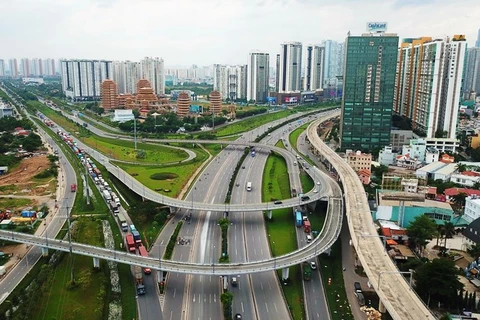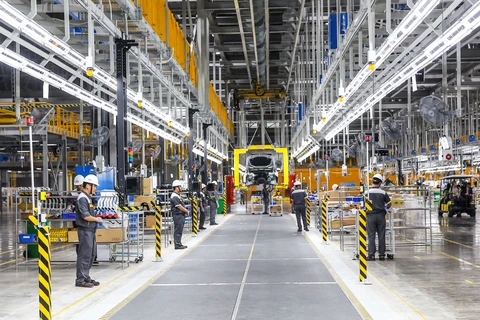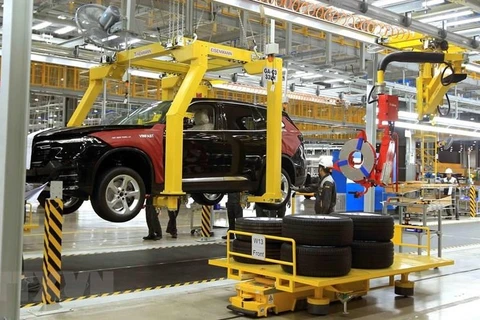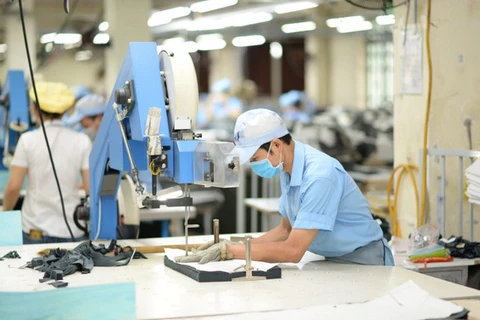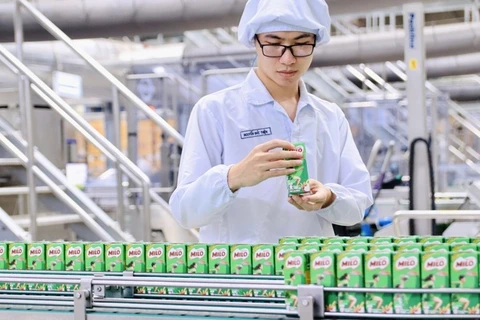Hanoi (VNA) – Foreign direct investment (FDI) flows into Vietnam are shifting to hi-tech sectors, Assoc. Prof. Dr. Ha Van Hoi from the UEB-VNU has said.
The FDI from large corporations who own advanced technologies is setting the scene for transfer of technology, know-how and expertise to Vietnamese enterprises to improve their competitive edge and build capacity for local economic sectors, he told an international conference on “Global FDI and Responses of FDI Enterprises in Vietnam in the New Context” held last week.
Echoing Hoi’s view, Assoc. Prof. Dr. Nguyen Thi Minh Nhan from the University of Commerce said studies show that there is a shift in FDI from the textile and garment industry to hi-tech industries, for example, computer and electronics manufacturing.
Hoi made several recommendations to help Vietnam lure more new-generation FDI, saying it is necessary to produce outstanding and competitive incentives to attract high-tech, eco-friendly projects, particularly those building R&D and innovative centres in Vietnam; and to strengthen linkages between foreign and domestic investors and facilitate technology transfer.
The country should also accelerate investment promotion to catch the eye of financially capable and experienced multinationals; keep a close watch on the movement of FDI and technologies into Vietnam to select proper investment projects; and enhance human resources quality, he added.
According to Assoc. Prof, Dr Nguyen Truc Le, Rector of the Vietnam National University (VNU)’s University of Economics and Business (UEB), Vietnam was named among the world’s Top 20 FDI recipients for the first time last year.
The “new normal” may pose various challenges to Vietnam but it also provides the country with many chances, he said, adding that these opportunities have been driven by the government’s highly-regarded effort to keep the COVID-19 at bay and boost economic growth at the same time for months. Vietnam is also taking advantage of new-generation free trade agreements to draw more FDI, he continued.
The launch of new incentives to selectively attract FDI and improve business climate also play a role in enhancing the quality of the FDI, he cited.
Expectation from the EU-Vietnam Free Trade Agreement (EVFTA) and EU-Vietnam Investment Protection Agreement (EVIPA) is driving the FDI from the EU into Vietnam, said Prof. Dr. Andreas Stoffers, Country Director of Friedrich Naumann Foundation for Freedom in Vietnam.
Vietnam is the most attractive destination among ASEAN member states, Stoffers said. Having one of the most liberal economic systems in the region, Vietnam offers appealing conditions for foreign investors to actively do business in the country, he noted, adding that it was not without reason that Vietnam was chosen by the EU to sign a trade pact with./.
The FDI from large corporations who own advanced technologies is setting the scene for transfer of technology, know-how and expertise to Vietnamese enterprises to improve their competitive edge and build capacity for local economic sectors, he told an international conference on “Global FDI and Responses of FDI Enterprises in Vietnam in the New Context” held last week.
Echoing Hoi’s view, Assoc. Prof. Dr. Nguyen Thi Minh Nhan from the University of Commerce said studies show that there is a shift in FDI from the textile and garment industry to hi-tech industries, for example, computer and electronics manufacturing.
Hoi made several recommendations to help Vietnam lure more new-generation FDI, saying it is necessary to produce outstanding and competitive incentives to attract high-tech, eco-friendly projects, particularly those building R&D and innovative centres in Vietnam; and to strengthen linkages between foreign and domestic investors and facilitate technology transfer.
The country should also accelerate investment promotion to catch the eye of financially capable and experienced multinationals; keep a close watch on the movement of FDI and technologies into Vietnam to select proper investment projects; and enhance human resources quality, he added.
According to Assoc. Prof, Dr Nguyen Truc Le, Rector of the Vietnam National University (VNU)’s University of Economics and Business (UEB), Vietnam was named among the world’s Top 20 FDI recipients for the first time last year.
The “new normal” may pose various challenges to Vietnam but it also provides the country with many chances, he said, adding that these opportunities have been driven by the government’s highly-regarded effort to keep the COVID-19 at bay and boost economic growth at the same time for months. Vietnam is also taking advantage of new-generation free trade agreements to draw more FDI, he continued.
The launch of new incentives to selectively attract FDI and improve business climate also play a role in enhancing the quality of the FDI, he cited.
Expectation from the EU-Vietnam Free Trade Agreement (EVFTA) and EU-Vietnam Investment Protection Agreement (EVIPA) is driving the FDI from the EU into Vietnam, said Prof. Dr. Andreas Stoffers, Country Director of Friedrich Naumann Foundation for Freedom in Vietnam.
Vietnam is the most attractive destination among ASEAN member states, Stoffers said. Having one of the most liberal economic systems in the region, Vietnam offers appealing conditions for foreign investors to actively do business in the country, he noted, adding that it was not without reason that Vietnam was chosen by the EU to sign a trade pact with./.
VNA

